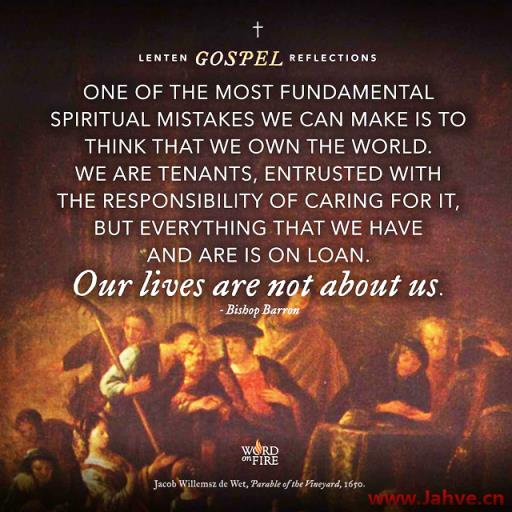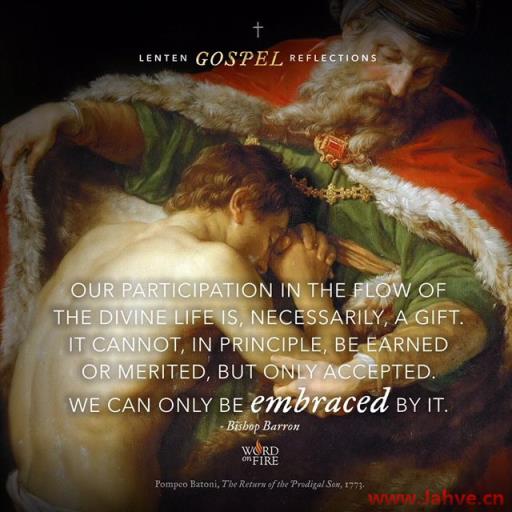 Bishop Barron翻译|Carrie2018-3-2
Bishop Barron翻译|Carrie2018-3-2 朋友们,就在耶稣受难和死亡前夕,祂讲述了今天福音中的故事。富饶的葡萄园代表以色列,即祂的选民,但可以扩展到全人类。我们从这个优美的意象中获得什么?就是天主为祂的子民准备了一个可以休息、享用、好好工作的地方。我们——以色列、教会、全人类——不是这个葡萄园的主人,而是租客。我们在精神上犯的最基本的错误之一是认为我们拥有这个世界。我们是租客,受委托承担起打点这个世界的责任,但我们拥有的一切和我们本身都是暂借的。我们的生活与我们自身无关。基督是天主的审判。我们都受祂的审判。由于我们杀死了祂,拒绝听从祂,我们的租赁权岌岌可危。因此,这段福音提出一个重要的问题:“我如何用天主恩赐于我的一切来服务天主?包括我的金钱、时间、天赋、创造力、关系?”一切都是为了天主,因而一切都受天主的审判。Friends, just before his Passion and Death, Jesus tells the striking story that is our Gospel for today. The fertile vineyard stands for Israel, his chosen people. But it could be broadened out to include the world. What do we learn from this beautiful image? That God has made for his people a place where they can find rest, enjoyment, good work.We—Israel, the Church, the world—are not the owners of this vineyard; we are tenants. One of the most fundamental spiritual mistakes we can make is to think that we own the world. We are tenants, entrusted with the responsibility of caring for it, but everything that we have and are is on loan. Our lives are not about us.Christ is God’s judgment. We are all under his judgment. In the measure that we kill him, refuse to listen to him, we place our tenancy in jeopardy. And so the great question that arises from this reading: "How am I using the gifts that God gave me for God’s purposes? My money? My time? My talents? My creativity? My relationships?" All is for God, and thus all is under God’s judgment.2018-3-3
朋友们,就在耶稣受难和死亡前夕,祂讲述了今天福音中的故事。富饶的葡萄园代表以色列,即祂的选民,但可以扩展到全人类。我们从这个优美的意象中获得什么?就是天主为祂的子民准备了一个可以休息、享用、好好工作的地方。我们——以色列、教会、全人类——不是这个葡萄园的主人,而是租客。我们在精神上犯的最基本的错误之一是认为我们拥有这个世界。我们是租客,受委托承担起打点这个世界的责任,但我们拥有的一切和我们本身都是暂借的。我们的生活与我们自身无关。基督是天主的审判。我们都受祂的审判。由于我们杀死了祂,拒绝听从祂,我们的租赁权岌岌可危。因此,这段福音提出一个重要的问题:“我如何用天主恩赐于我的一切来服务天主?包括我的金钱、时间、天赋、创造力、关系?”一切都是为了天主,因而一切都受天主的审判。Friends, just before his Passion and Death, Jesus tells the striking story that is our Gospel for today. The fertile vineyard stands for Israel, his chosen people. But it could be broadened out to include the world. What do we learn from this beautiful image? That God has made for his people a place where they can find rest, enjoyment, good work.We—Israel, the Church, the world—are not the owners of this vineyard; we are tenants. One of the most fundamental spiritual mistakes we can make is to think that we own the world. We are tenants, entrusted with the responsibility of caring for it, but everything that we have and are is on loan. Our lives are not about us.Christ is God’s judgment. We are all under his judgment. In the measure that we kill him, refuse to listen to him, we place our tenancy in jeopardy. And so the great question that arises from this reading: "How am I using the gifts that God gave me for God’s purposes? My money? My time? My talents? My creativity? My relationships?" All is for God, and thus all is under God’s judgment.2018-3-3 朋友们,今天的福音是耶稣最有名的比喻:浪子回头。自身代表着圣父的耶稣通过这个故事刻画了圣父的典型形象,因此耶稣间接地描绘了一幅含蓄的自画像。故事中那位慈父的接纳性怀抱是圣父的真实写照,因而也代表了耶稣接纳世人的怀抱。这位慈父拥抱亲吻自己的浪子时是怎样的呢?浪子说:“父亲!我得罪了天,也得罪了你,我不配再称作你的儿子了!”每当《圣经》中的人物近距离接触神圣的恩宠,他们都会强烈地感受到自己不配拥有这种荣幸。故事中的浪子正是如此。但慈父毫不理会这种精心琢磨过的说话,并迫不及待地叫仆人准备欢宴。我们若能荡漾在神圣的生活中,就必然是天主的恩赐。我们在原则上是无法赚取这种恩赐或论功行赏的,我们能做的就只有接受祂的深情拥抱。Friends, our Gospel today is Jesus’ best-known parable: the story of the prodigal son.In considering this narrative, we are dealing with an icon of the Father told by the one who is himself the Icon of the Father. Thus we have Jesus indirectly crafting a subtle self-portrait. The gathering embrace of the father in the story mirrors that of the heavenly Father, which in turn is represented in that of Jesus.What happens when the father embraces his son and kisses him? The boy speaks: “Father, I have sinned against heaven and against you; I no longer deserve to be called your son.” Whenever characters in the Bible come close to the divine grace, they experience a heightened sense of their own unworthiness. This is the dynamic at work in the case of the prodigal son.But his father ignores his carefully rehearsed speech, and, with an eagerness bordering on impatience, instructs his servants to prepare a celebration. Our participation in the flow of the divine life is, necessarily, a gift. It cannot, in principle, be earned or merited, but only accepted. We can only be embraced by it.
朋友们,今天的福音是耶稣最有名的比喻:浪子回头。自身代表着圣父的耶稣通过这个故事刻画了圣父的典型形象,因此耶稣间接地描绘了一幅含蓄的自画像。故事中那位慈父的接纳性怀抱是圣父的真实写照,因而也代表了耶稣接纳世人的怀抱。这位慈父拥抱亲吻自己的浪子时是怎样的呢?浪子说:“父亲!我得罪了天,也得罪了你,我不配再称作你的儿子了!”每当《圣经》中的人物近距离接触神圣的恩宠,他们都会强烈地感受到自己不配拥有这种荣幸。故事中的浪子正是如此。但慈父毫不理会这种精心琢磨过的说话,并迫不及待地叫仆人准备欢宴。我们若能荡漾在神圣的生活中,就必然是天主的恩赐。我们在原则上是无法赚取这种恩赐或论功行赏的,我们能做的就只有接受祂的深情拥抱。Friends, our Gospel today is Jesus’ best-known parable: the story of the prodigal son.In considering this narrative, we are dealing with an icon of the Father told by the one who is himself the Icon of the Father. Thus we have Jesus indirectly crafting a subtle self-portrait. The gathering embrace of the father in the story mirrors that of the heavenly Father, which in turn is represented in that of Jesus.What happens when the father embraces his son and kisses him? The boy speaks: “Father, I have sinned against heaven and against you; I no longer deserve to be called your son.” Whenever characters in the Bible come close to the divine grace, they experience a heightened sense of their own unworthiness. This is the dynamic at work in the case of the prodigal son.But his father ignores his carefully rehearsed speech, and, with an eagerness bordering on impatience, instructs his servants to prepare a celebration. Our participation in the flow of the divine life is, necessarily, a gift. It cannot, in principle, be earned or merited, but only accepted. We can only be embraced by it.

微信小程序
微信扫一扫体验

微信公众账号
微信扫一扫加关注
顶部
